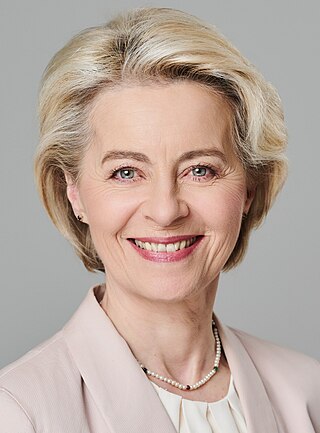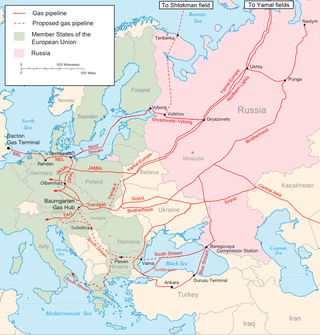
Andris Piebalgs is a Latvian politician and diplomat who served as European Commissioner for Development at the European Commission from 2010 until 2014. Between 2004 and 2009 he served as Commissioner for Energy. Between 4 June 2016 and 19 August 2017, he served as the leader of the Unity party.

The Druzhba pipeline ; also has been referred to as the Friendship Pipeline and the Comecon Pipeline) is one of the world's longest oil pipelines and one of the largest oil pipeline networks in the world. It began operation in 1964 and remains in operation today. It carries oil some 4,000 kilometres (2,500 mi) from the eastern part of European Russia to points in Ukraine, Belarus, Poland, Hungary, Slovakia, the Czech Republic and Germany. The network also branches out into numerous smaller pipelines to deliver its product throughout Eastern Europe and beyond.

Günther Hermann Oettinger is a German lawyer and politician of the Christian Democratic Union (CDU) who served as European Commissioner for Budget and Human Resources from 2017 to 2019, as European Commissioner for Digital Economy and Society from 2014 to 2016 and as European Commissioner for Energy from 2010 to 2014.

Ursula Gertrud von der Leyen is a German politician, serving as the 13th president of the European Commission since 2019. She served in the German federal government between 2005 and 2019, holding positions in Angela Merkel's cabinet, most recently as federal minister of defence. She is a member of the centre-right Christian Democratic Union (CDU) and its affiliated europarty, the European People's Party (EPP). On 7 March 2024, the EPP elected her as its Spitzenkandidat to lead the campaign for the 2024 European parliament elections. She was re-elected to head the Commission in July 2024.

The Russia–Ukraine gas disputes refer to a number of disputes between Ukrainian oil and gas company Naftogaz Ukrayiny and Russian gas supplier Gazprom over natural gas supplies, prices, and debts. These disputes have grown beyond simple business disputes into transnational political issues—involving political leaders from several countries—that threaten natural gas supplies in numerous European countries dependent on natural gas imports from Russian suppliers, which are transported through Ukraine. Russia provides approximately a quarter of the natural gas consumed in the European Union; approximately 80% of those exports travel through pipelines across Ukrainian soil prior to arriving in the EU.

Naftogaz of Ukraine is the largest national oil and gas company of Ukraine. It is a state-owned company subordinated to the Government of Ukraine. The vertical-integrated company carries out a complete cycle of exploration operations and development of deposits, operating and exploratory drilling, extraction, transportation, and refinement of natural gas and crude oil, supply of natural and liquefied gas to consumers.

The Trans-Caspian Gas Pipeline is a proposed subsea pipeline between Türkmenbaşy in Turkmenistan, and Baku in Azerbaijan. According to some proposals it would also include a connection between the Tengiz Field in Kazakhstan, the Sangachal Terminal in Baku, and Türkmenbaşy. The Trans-Caspian Gas Pipeline project would transport natural gas from Turkmenistan and Kazakhstan to European Union member countries, circumventing both Russia and Iran. It would do this by feeding the Southern Gas Corridor. This project attracts significant interest since it would connect vast Turkmen gas resources to major consumers Turkey and Europe.

The Russia–Belarus energy dispute began when Russian state-owned gas supplier Gazprom demanded an increase in gas prices paid by Belarus, a country which has been closely allied with Moscow and forms a loose union state with Russia. It escalated on 8 January 2007, when the Russian state-owned pipeline company Transneft stopped pumping oil into the Druzhba pipeline which runs through Belarus because Belarus was siphoning the oil off the pipe without mutual agreement. On 10 January, Transneft resumed oil exports through the pipeline after Belarus ended the tariff that sparked the shutdown, despite differing messages from the parties on the state of negotiations.

The energy policy of the European Union focuses on energy security, sustainability, and integrating the energy markets of member states. An increasingly important part of it is climate policy. A key energy policy adopted in 2009 is the 20/20/20 objectives, binding for all EU Member States. The target involved increasing the share of renewable energy in its final energy use to 20%, reduce greenhouse gases by 20% and increase energy efficiency by 20%. After this target was met, new targets for 2030 were set at a 55% reduction of greenhouse gas emissions by 2030 as part of the European Green Deal. After the Russian invasion of Ukraine, the EU's energy policy turned more towards energy security in their REPowerEU policy package, which boosts both renewable deployment and fossil fuel infrastructure for alternative suppliers.

Russia's energy policy is presented in the government's Energy Strategy document, first approved in 2000, which sets out the government's policy to 2020. The Energy Strategy outlines several key priorities: increased energy efficiency, reducing the impact on the environment, sustainable development, energy development and technological development, as well as improved effectiveness and competitiveness. Russia's greenhouse gas emissions are large because of its energy policy. Russia is rich in natural energy resources and is one of the world's energy superpowers. Russia is the world's leading net energy exporter, and was a major supplier to the European Union until the Russian invasion of Ukraine. Russia has signed and ratified the Kyoto Protocol and Paris Agreement. Numerous scholars posit that Russia uses its energy exports as a foreign policy instrument towards other countries.

Energy security is the association between national security and the availability of natural resources for energy consumption. Access to cheaper energy has become essential to the functioning of modern economies. However, the uneven distribution of energy supplies among countries has led to significant vulnerabilities. International energy relations have contributed to the globalization of the world leading to energy security and energy vulnerability at the same time.

The Energy in Russia is an area of the national economy, science, and technology of the Russian Federation, encompassing energy resources, production, transmission, transformation, accumulation, distribution, and consumption of various types of energy.

The Republic of Azerbaijan and the European Union (EU) have maintained a positive relationship through the years and have become more closely linked since 1991. Azerbaijan is currently part of the European Neighborhood Policy, the Eastern Partnership and the Council of Europe. The EU is the largest foreign grant donor to and investor in Azerbaijan, both in the government sector and civil society, making available over 600 million EURO of bilateral EU assistance since 1992.

Miguel Arias Cañete is a Spanish politician who served as European Commissioner for Energy and Climate Action in the Juncker Commission from 2014 to 2019.

Russia supplies a significant volume of fossil fuels to other European countries. In 2021, it was the largest exporter of oil and natural gas to the European Union, (90%) and 40% of gas consumed in the EU came from Russia.

The history of the European Union from 2004 to the present is the current timeline of the European Union. It is a period of significant upheaval and reform following the 2004 enlargement of the European Union. The EU has taken on ten new members, eight of which were initially much poorer than the EU average, and took in a further two in 2007 with many more on the way. It created the euro a few years before and had to expand this, and the Schengen Area to its new members. However this was overshadowed by the late-2000s recession and damaging disputes over the European Constitution and its successor, the Treaty of Lisbon. Throughout this period, the European People's Party has been the largest group in the European Parliament and provides every President of the European Commission.

The Juncker Commission was the European Commission in office from 1 November 2014 to 30 November 2019. Its president was Jean-Claude Juncker, who presided over 27 other commissioners. In July 2014, Juncker was officially elected to succeed José Manuel Barroso, who completed his second five-year term in that year.
A global energy crisis began in the aftermath of the COVID-19 pandemic in 2021, with much of the globe facing shortages and increased prices in oil, gas and electricity markets. The crisis was caused by a variety of economic factors, including the rapid post-pandemic economic rebound that outpaced energy supply, and escalated into a widespread global energy crisis following the Russian invasion of Ukraine. The price of natural gas reached record highs, and as a result, so did electricity in some markets. Oil prices hit their highest level since 2008.






























